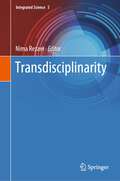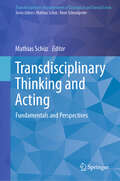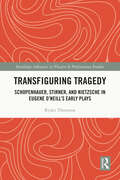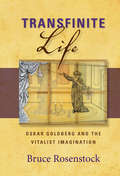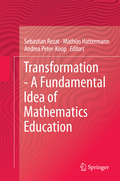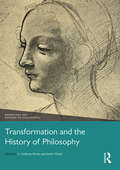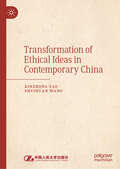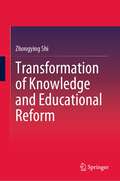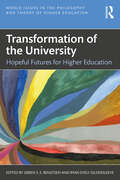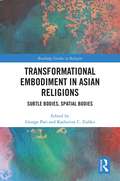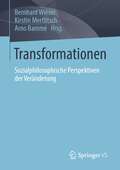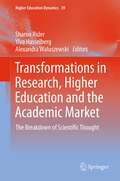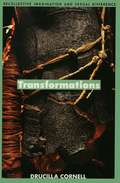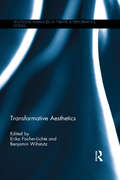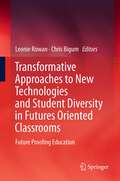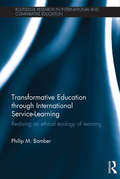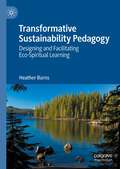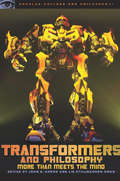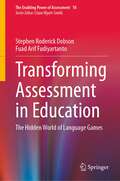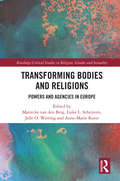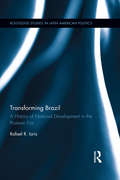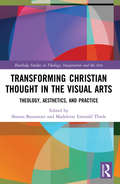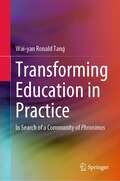- Table View
- List View
Transdisciplinarity (Integrated Science #5)
by Nima RezaeiThis contributed volume book aims at discussing transdisciplinary approaches to address common problems. By working transdisciplinarily, researchers coming from different disciplines can work jointly using a shared conceptual framework bringing together disciplinary-specific theories and concepts. There are numerous barriers that can obstruct effective communication between different cultures, communities, religions and geographies. This book shows that through bringing together different disciplines, researchers not only can surpass these barriers but can effectively produce new venues of thought that can positively affect the development and evolution of research and education. The book discusses new and emerging applications of knowledge produced by transdisciplinary efforts and covers the interplay of many disciplines, including agriculture, economics, mathematics, engineering, industry, information technology, marketing, nanoscience, neuroscience, space exploration, human-animal relationships, among others. Consequently, it also covers the relationship between art and science, as one of the most remarkable transdisciplinary approaches that paves the way for new methods in engineering, design, architecture and many other fields.
Transdisciplinary Thinking and Acting: Fundamentals and Perspectives (Transdisciplinary Management of Ecological and Social Crises)
by Mathias SchüzComplex problems can only be overcome with complex solutions. This dictum by Albert Einstein also applies to current world problems such as climate change, species extinction, the littering of our planet, and the growing gap between rich and poor. They overwhelm individual scientific disciplines. Therefore, they can only be solved through transdisciplinarity, i.e. beyond the individual disciplines in interaction with empirical knowledge of different provenance and philosophical reflection. This first volume of the book series "Transdisciplinary Management of Social and Ecological Crises" explains how transdisciplinarity is to be understood in general, what approaches exist, and how they contribute to solving the various world problems. In this context, the book addresses, among other things, the replacement of man's claim to dominion over nature, the overcoming of culturally determined boundaries in human communities, and integrative and agile management methods in business, politics, art, and society. It deals with a sustainable circular economy, new forms of politics in the interest of all instead of a few, learning from artists, healthy and environmentally sound nutrition, and spiritual mindfulness in dealing with oneself and other ways of life. Thus, the book is aimed at a broad audience from different disciplines interested in the perspective of and interaction with other disciplines to solve global problems. Chapter "Methodology of Transdisciplinarity–Levels of Reality, Logic of the Included Middle and Complexity" is available open access under a Creative Commons Attribution 4.0 International License via link.springer.com.
Transfiguring Tragedy: Schopenhauer, Stirner, and Nietzsche in Eugene O’Neill’s Early Plays (ISSN)
by Ryder ThorntonThis book demonstrates Eugene O’Neill’s use of philosophy in the early period of his work and provides analyses of selected works from that era, concluding with The Hairy Ape, completed in 1921, as an illustration of the mastery he had achieved in dramatizing key concepts of philosophy.Analyses of one-act and full-length plays from 1913 to 1921 reveal the influence of the three philosophers and establish that O’Neill was fundamentally a philosophic playwright, even from his earliest dramatic sketches. Specific concepts from Schopenhauer, Stirner, and Nietzsche went into O’Neill’s shaping of character arcs, dramatic circumstances, symbology, and theme. Among them are Schopenhauer’s concept of will and representation, Stirner’s notion of possession, and Nietzsche’s principle of the Apollonian–Dionysian duality. These ideas were foundational to O’Neill’s construction of tragic irony apparent in his early period plays. The critical concepts of these three philosophers are the major pathways in this study. However, such an approach inevitably reveals other layers of spiritual influence, such as Catholicism and Eastern philosophy, which are touched on in these analyses.This book is a much-needed introduction to philosophic concepts in Eugene O’Neill’s early work and would be of great interest to students and scholars in theatre studies and philosophy.
Transfiguring the Arts and Sciences
by Jon KlancherIn this important and innovative study Jon Klancher shows how the Romantic age produced a new discourse of the 'Arts and Sciences' by reconfiguring the Enlightenment's idea of knowledge and by creating new kinds of cultural institutions with unprecedented public impact. He investigates the work of poets, lecturers, moral philosophers, scientists and literary critics – including Coleridge, Godwin, Bentham, Davy, Wordsworth, Robinson, Shelley and Hunt – and traces their response to book collectors and bibliographers, art-and-science administrators, painters, engravers, natural philosophers, radical journalists, editors and reviewers. Taking a historical and cross-disciplinary approach, he opens up Romantic literary and critical writing to transformations in the history of science, history of the book, art history, and the little-known history of arts-and-sciences administration that linked early-modern projects to nineteenth- and twentieth-century modes of organizing 'knowledges'. His conclusions transform the ways we think about knowledge, both in the Romantic period and in our own.
Transfinite Life: Oskar Goldberg and the Vitalist Imagination
by Bruce RosenstockOskar Goldberg was an important and controversial figure in Weimar Germany. He challenged the rising racial conception of the state and claimed that the Jewish people were on a metaphysical mission to defeat race-based statism. He attracted the attention of his contemporaries--Walter Benjamin, Gershom Scholem, Thomas Mann, and Carl Schmitt, among others--with the argument that ancient Israel's sacrificial rituals held the key to overcoming the tyranny of technology in the modern world. Bruce Rosenstock offers a sympathetic but critical philosophical portrait of Goldberg and puts him into conversation with Jewish and political figures that circulated in his cultural environment. Rosenstock reveals Goldberg as a deeply imaginative and broad-minded thinker who drew on biology, mathematics, Kabbalah, and his interests in ghost photography to account for the origin of the earth. Caricatured as a Jewish proto-fascist in his day, Goldberg's views of the tyranny of technology, biopolitics, and the "new vitalism" remain relevant to this day.
Transformation - A Fundamental Idea of Mathematics Education
by Sebastian Rezat Mathias Hattermann Andrea Peter-KoopThe diversity of research domains and theories in the field of mathematics education has been a permanent subject of discussions from the origins of the discipline up to the present. On the one hand the diversity is regarded as a resource for rich scientific development on the other hand it gives rise to the often repeated criticism of the discipline's lack of focus and identity. As one way of focusing on core issues of the discipline the book seeks to open up a discussion about fundamental ideas in the field of mathematics education that permeate different research domains and perspectives. The book addresses transformation as one fundamental idea in mathematics education and examines it from different perspectives. Transformations are related to knowledge, related to signs and representations of mathematics, related to concepts and ideas, and related to instruments for the learning of mathematics. The book seeks to answer the following questions: What do we know about transformations in the different domains? What kinds of transformations are crucial? How is transformation in each case conceptualized?
Transformation and the History of Philosophy (Rewriting the History of Philosophy)
by G. Anthony Bruno Justin VlasitsFrom ancient conceptions of becoming a philosopher to modern discussions of psychedelic drugs, the concept of transformation plays a fascinating part in the history of philosophy. However, until now there has been no sustained exploration of the full extent of its role. Transformation and the History of Philosophy is an outstanding survey of the history, nature, and development of the idea of transformation, from the ancient period to the twentieth century. Comprising twenty-two specially commissioned chapters by an international team of contributors, the volume is divided into four clear parts: Philosophy as Transformative: Ancient China, Greece, India, and Rome Transformation Between the Human and the Divine: Medieval and Early Modern Philosophy Transformation After the Copernican Revolution: Post-Kantian Philosophy Treatises, Pregnancies, Psychedelics, and Epiphanies: Twentieth-Century Philosophy Each of these sections begins with an introduction by the editors. Transformation and the History of Philosophy is essential reading for students and researchers in the history of western and non-western philosophy, ethics, metaphysics, and aesthetics. It will also be extremely useful for those in related disciplines such as religion, sociology, and the history of ideas.
Transformation of Ethical Ideas in Contemporary China
by Xinzhong Yao Shuihuan WangThis book takes Confucian ethics as the main line, time and space as the longitude and latitude, and concisely demonstrates the changes of Chinese traditional ethics and their modern values. Its connotation starts from the basic moral norms of "five Ethics" and "five Virtues", and from the multi-dimensional perspectives of self-cultivation, family ethics, social ethics, political ethics, and environmental ethics. It highlights the core characteristics of the integration of individual virtues and public morals, such as benevolence, righteousness, propriety, wisdom, courtesy, leniency, faith, sensitivity, earnestness, kindness, goodness, virtue, and conduct, and discusses the ethical requirements of loyalty, harmony, filial piety, fraternity, and bravery, which are constantly gaining and losing with the changes of the times. This book focuses on the vitality of Chinese ethical innovation in the context of globalization and modernization, showing how it demonstrates its value in the complex process of dialogue with other civilizations in the world and interaction between China and foreign countries, and how it contributes to the construction of a community with a shared future for mankind and the promotion of world peace and prosperity.
Transformation of Knowledge and Educational Reform
by Zhongying ShiThis book defines the concept of knowledge transformation, describes the historical process of knowledge transformation, and analyses its deep influence on education theory and practice by virtue of multiple discipline resources. The general scope of this book encompasses the philosophy of education, curriculum studies, and education reform research. It enables readers to understand how 'hidden' epistemological factors have changed or reshaped the education system throughout history and at present.
Transformation of the University: Hopeful Futures for Higher Education (World Issues in the Philosophy and Theory of Higher Education)
by Søren S. E. BengtsenTransformation of the University imagines preferable futures for the university, building hope for the institution’s necessary transformation. It transcends old criticisms and presents fresh ideas on how the institution might be conceived, organised and put into practice while safeguarding that which makes it a university – the pursuit of knowledge. This book is divided into three main parts: Part One – ‘Knowledge’ assumes the role of the university in generating knowledge for the benefit of society; Part Two – ‘Cultural Growth’ expands on how the university might contribute to and benefit from the cultural growth of society, with both explicit and implicit connections to social and epistemic (in)justice; and Part Three – ‘Institutions’ focuses on imaginative processes for enacting the university as an institution that meets the unforeseen future challenges facing societies around the world. With contributions from scholars across the world, Transformation of the University is an essential read for all academics, practitioners, institutional leaders and broad social thinkers who are concerned with the future of the university and its contributions to society.
Transformational Embodiment in Asian Religions: Subtle Bodies, Spatial Bodies (Routledge Studies in Religion)
by George Pati Katherine ZubkoThis volume examines several theoretical concerns of embodiment in the context of Asian religious practice. Looking at both subtle and spatial bodies, it explores how both types of embodiment are engaged as sites for transformation, transaction and transgression. Collectively bridging ancient and modern conceptualizations of embodiment in religious practice, the book offers a complex mapping of how body is defined. It revisits more traditional, mystical religious systems, including Hindu Tantra and Yoga, Tibetan Buddhism, Bon, Chinese Daoism and Persian Sufism and distinctively juxtaposes these inquiries alongside analyses of racial, gendered, and colonized bodies. Such a multifaceted subject requires a diverse approach, and so perspectives from phenomenology and neuroscience as well as critical race theory and feminist theology are utilised to create more precise analytical tools for the scholarly engagement of embodied religious epistemologies. This a nuanced and interdisciplinary exploration of the myriad issues around bodies within religion. As such it will be a key resource for any scholar of Religious Studies, Asian Studies, Anthropology, Sociology, Philosophy, and Gender Studies.
Transformationen: Sozialphilosophische Perspektiven der Veränderung
by Bernhard Wieser Kirstin Mertlitsch Arno BamméDer Band setzt sich mit aktuellen Transformationsprozessen auseinander. Globale Ereignisse wie Klimawandel, Covid-19 Pandemie, ökonomischer und sozialer Wandel sowie Veränderungen traditioneller Geschlechterverhältnisse werfen Fragen auf, wie diese Veränderungsprozesse verstanden und konstruktiv gestaltet werden können. Die Komplexität dieser Problemstellung erforderte einen inter- und transdisziplinären Zugang, wie er im vorgeschlagenen Band realisiert wird. Die Autor*innen des Bandes diskutieren anhand von konkreten Beispielen zentrale Herausforderungen aktueller Transformationsprozesse und stellen zusammengenommen eine Reflexionsgrundlage bereit, mit der dem beobachteten Wandel begegnet werden kann.
Transformations in Research, Higher Education and the Academic Market: The Breakdown of Scientific Thought
by Alexandra Waluszewski Sharon Rider Ylva HasselbergThis volume tackles head-on the controversy regarding the tensions between the principles underlying Academe on the one hand, and the free market on the other. Its outspoken thesis posits that seemingly irresistible institutional pressures are betraying a core principle of the Enlightenment: that the free pursuit of knowledge is of the highest value in its own right. As 'market principles' are forced on universities, inducing a neoteric culture of 'managerialism', many worry that the very characteristics that made European higher education in particular such a success are being eroded and replaced by ideological opportunism and economic expediency. Richly interdisciplinary, the anthology explores a wealth of issues such as the phenomenon of bibliometrics (linking an institution's success to the volume and visibility of publications produced). Many argue that the use of such indicators to measure scientific value is inimical to the time-consuming complexities of genuine truth-seeking. A number of the greatest discoveries and innovations in the history of science, such as Newton's laws of mechanics or the Mendelian laws of inheritance, might never have seen the light of day if today's system of determining and defining the form and content of science had dominated. With analytical perspectives from political science, economics, philosophy and media studies, the collection interrogates, for example, the doctrine of graduate employability that exerts such a powerful influence on course type and structure, especially on technical and professional training. In contrast, the liberal arts must choose between adaptation to the dictates of employability strategies or wither away as enrollments dwindle and resources evaporate. Research projects and aims have also become an area of controversy, with many governments now assessing the value of proposals in terms of assumed commercial benefits. The contributors argue that these changes, as well as 'reforms' in the managerial and administrative structures in tertiary education, constitute a radical break with the previous ontology of science and scholarship: a change in its very character, and not merely its form. It shows that the 'scientific thinking' students, researchers, and scholars are encouraged to adopt is undergoing a rapid shift in conceptual content, with significant consequences not only for science, but also for the society of which it is a part.
Transformations: Recollective Imagination and Sexual Difference (Just Ideas Ser.)
by Drucilla CornellIn a unique rethinking of political transformation, Drucilla Cornell argues for the crucial role of psychoanalysis in social theory in voicing connection between our constitution as gendered subjects and social and political change.
Transformative Aesthetics: A New Aesthetics (Routledge Advances in Theatre & Performance Studies)
by Erika Fischer-Lichte Benjamin WihstutzAesthetic theory in the West has, until now, been dominated by ideas of effect, autonomy, and reception. Transformative Aesthetics uncovers these theories’ mutual concern with the transformation of those involved. From artists to spectators, readers, listeners, or audiences, the idea of transformation is one familiar to cultures across the globe. Transformation of the individual is only one part of this aesthetic phenomenon, as contemporary artists are increasingly called upon to have a transformative, sustainable impact on society at large. To this end, Erika Fischer Lichte and Benjamin Wihstutz present a series of fresh perspectives on the discussion of aesthetics, uniting Western theory with that of India, China, Australia, and beyond. Each chapter of Transformative Aesthetics focuses on a different approach to transformation, from the foundations of aesthetics to contemporary theories, breaking new ground to establish a network of thought that spans theatre, performance, art history, cultural studies, and philosophy.
Transformative Approaches to New Technologies and Student Diversity in Futures Oriented Classrooms
by Leonie Rowan Chris BigumIn this book we outline an optimistic, aspirational and unashamedly ambitious agenda for schooling. We make cautious use of the concept of 'future proofing' to signal the commitment of the various authors to re-thinking the purposes, content and processes of schooling with a view to ensuring that all children, from all backgrounds are prepared by their education to make a positive contribution to the futures that are ahead of them. The book focuses on issues relating to technology and social justice to re-examine the traditional relationship between schools and technology, between schools and diverse learners, and between schools, children and knowledge. Drawing from examples from around the world, the book explores practical ways that diverse schools have worked to celebrate diverse understandings of what it means to be a learner, a citizen, a worker in these changed and changing times and the ways different technologies can support this agenda.
Transformative Education through International Service-Learning: Realising an ethical ecology of learning (Routledge Research in International and Comparative Education)
by Philip M BamberTransformative learning is a compelling approach to learning that is becoming increasingly popular in a diverse range of educational settings and encounters. This book reconceptualises transformative learning through an investigation of the learning process and outcomes of International Service-Learning (ISL), a pedagogical approach that blends student learning with community engagement overseas and the development of a more just society. Drawing upon key philosophers and theorists, Bamber offers an integrated, multi-dimensional approach, linking transformative learning to the development of the authentic self, and analysing the aesthetic, moral and relational dimensions of ISL in an increasingly globalized world. Chapters explore rich empirical data to provide a timely framework and ethical ecology of transformative learning, detailing the challenges facing the approach, and how it can be embedded at the levels of practice, institutional ethos and partnership. Transformative Learning through International Service-Learning will appeal to academics, researchers, teachers, instructors and leaders in the fields of service-learning, international education, character education and in adult learning and education. It will also be of interest to practitioners working in international education, development education, volunteering, service-learning and community engagement.
Transformative Sustainability Pedagogy: Designing and Facilitating Eco-Spiritual Learning
by Heather BurnsThis book offers stories and tools for designing and facilitating transformative sustainability pedagogy and explores how educators can intentionally design and facilitate eco-spiritual learning that promotes healing and wholeness. In these times of accelerating climate change and systemic injustice, we need learning spaces that both challenge our unsustainable dominant paradigms and support us in re-learning how to live in relational and regenerative ways. Rooted in the paradigm of interconnection and relationality, this book offers practical ways to design and facilitate learning toward more just, ecological, and spiritual ways of being. The author weaves together a variety of personal stories of teaching and learning, an exploration of how new science can be applied to transformative sustainability pedagogy, and eco-spiritual practices to help educators nurture wholeness and connection in themselves and in learning spaces.
Transformers and Philosophy: More than Meets the Mind
by John R. Shook Liz Stillwaggon SwanTransformers began with toys and a cartoon series in 1984 and has since grown to include comic books, movies, and video games - its science fiction story has reached an audience with a wide range second only to that of Star Wars.<P><P> Here, in Transformers and Philosophy, a dream team of philosophers pursues the fascinating questions posed by humankind's encounter with an artificially intelligent mechanical civilization: Is genuine artificial intelligence possible? Would a robotic civilization come with its own morality and artistic life, and would it find a need for romantic love? Should we be more careful about developing robots that may eventually develop ideas of their own? Transformers and Philosophy puts Transformers under a microscope and exposes its philosophical implications in an instantly readable way.
Transforming Assessment in Education: The Hidden World of Language Games (The Enabling Power of Assessment #10)
by Stephen Roderick Dobson Fuad Arif FudiyartantoThis book transforms our current understanding of assessment practice in different educational settings and cultures. Drawing upon the resources of language games and critical realism the authors argue for an innovative engagement with the philosophical, theoretical and practical foundations of assessment. What is the connection between learning, motivation and assessment? Is assessment for learning a motorway or a blind alley for improved learning outcomes? How can creativity be assessed through the eyes of the connoisseur? How can assessment cultures be understood as forms of life and language games? Do new forms of society transform our assessment practices? A critical appreciation of the work of Royce Sadler is offered for assessment specialists.
Transforming Bodies and Religions: Powers and Agencies in Europe (Routledge Critical Studies in Religion, Gender and Sexuality)
by Mariecke Van Den Berg Lieke Schrijvers Jelle Wiering Anne-Marie KorteThis book sheds an interdisciplinary light on ‘transforming bodies’: bodies that have been subjected to, contributed to, or have resisted social transformations within religious or secular contexts in contemporary Europe. It explores the intersections of race, ethnicity, gender, sexuality and religion that underpin embodied transformations. Using post-secularist, postcolonial and gender/queer perspectives, it aims to gain a better understanding of the orchestrations and effects of larger social transitions related to religion. This volume is the outcome of the intensive collaboration of the authors, who for years have been meeting regularly in Utrecht, the Netherlands, to discuss themes related to religion and ‘the challenge of difference’, with an added afterword by Prof. Pamela Klassen from the University of Toronto. The book is divided in three subsections that focus on particular types of embodiment: body politics in governmental and NGO organisations; the role of the body in literary and/or autobiographical narratives; and ethnographic case studies of bodies in daily life. Doing so, it provides an innovative exploration of contemporary religion and the body. It will, therefore, be of great interest to scholars of Religious Studies, Gender and Sexuality Studies, Post-Colonial Studies, Anthropology, Sociology, Theology, and Philosophy.
Transforming Brazil: A History of National Development in the Postwar Era (Routledge Studies in Latin American Politics)
by Rafael R. IorisIn this book, Rafael R. Ioris critically revisits the postwar context in Brazil to reexamine traditional questions and notions pertaining to the nature of Latin America’s political culture and institutions. It was in this period that the region lived some of its most intense and successful experiences of fast economic growth, which was paradoxically marred by heightened ideological divisions, political disruptions, and the emergence of widespread authoritarian rule. Combining original sources of political, diplomatic, intellectual, cultural, and labor histories, Ioris provides a comprehensive history of the fruitful debates concerning national development in postwar Brazil, a time when the so-called country of the future faced one of its best moments for consolidating political democracy and economic prosperity. He argues that traditional views on political instability have been excessively grounded on an institutional focus, which should be replaced by in-depth analysis of events on the ground. In so doing, he reveals that as national development meant very different things to multiple different social segments of the Brazilian society, no unified support could have been provided to the democratically elected political regime when things rapidly became socially and politically divisive early in the 1960s. Innovating in its multidimensional analytical scope and interdisciplinary focus, Transforming Brazil provides a rich political, cultural, and intellectual examination of a historical period characterized by rapid socio-economic changes amidst significant political instability and the heightened ideological polarization shaping the political scenario of Brazil and much of Latin America in the Cold War era.
Transforming Christian Thought in the Visual Arts: Theology, Aesthetics, and Practice (Routledge Studies in Theology, Imagination and the Arts)
by Sheona Beaumont and Madeleine Emerald ThieleThis volume explores how the visual arts are presenting and responding to Christian theology and demonstrates how modern and contemporary artists and artworks have actively engaged in conversation with Christianity. Modern intellectual enquiry has often been reluctant to engage theology as an enriching or useful form of visual analysis, but critics are increasingly revisiting religious narratives and Christian thought in pursuit of understanding our present-day visual culture. In this book an international group of contributors demonstrate how theology is often implicit within artworks and how, regardless of a viewer’s personal faith, it can become implicit in a viewer’s visual encounter. Their observations include deliberate juxtaposition of Christian symbols, imaginative play with theologies, the validation of non-confessional or secular public engagement, and inversions of biblical interpretation. Case studies such as an interactive Easter, glow-sticks as sacrament, and visualisation of the Bible’s polyphonic voices enrich this discussion. Together, they call for a greater interpretative generosity and more nuance around theology’s cultural contexts in the modern era. By engaging with theology, culture, and the visual art, this collection offers a fresh lens through which to see the interaction of religion and art. As such, it will be of great use to those working in Religion and the Arts, Visual Art, Material Religion, Theology, Aesthetics, and Cultural Studies.
Transforming Conflict through Insight
by Kenneth R Melchin Cheryl A. PicardExamining the difficulties of conflict resolution, Transforming Conflict through Insight demonstrates how applying Bernard Lonergan's philosophy of insight to mediation can lead to more productive and constructive negotiations. Kenneth R. Melchin and Cheryl A. Picard provide both an overview of conflict research and an introduction to Lonergan's "insight theory," offering an outstanding piece of ethical philosophy and a useful method of mediation. Introducing readers to a method of self-discovery, the different kinds of operations involved in learning, and the role of feelings and values in shaping interactions with others in conflict, this volume also includes the practical experience of mediators who detail strategies of insight mediation for working creatively through conflict. Attending to the important role played by transformative learning in navigating conflicts, the authors show how insights and learning can move people past obstacles caused by feelings of threat. Informative, compassionate, and convincing, Transforming Conflict through Insight is a welcome resource for working to resolve difficulties in an ethical and educational manner.
Transforming Education in Practice: In Search of a Community of Phronimos
by Wai-yan Ronald TangThis book inspires educational practitioners with special regard to the way how practice in the frontline service is able to inform leadership and policy decision. It empowers them to identify what features are counted as professional and how they could be turned into sources for developing wise judgment and eliciting creative acts in teaching, lesson planning and course design, collaboration, and knowledge excavation to shape policy decision and planning. In addition, for those who are used to conceive the world and their practice from a positivist tradition may find the insights of this book illuminating particularly when they are looking for a paradigm shift in understanding their practice. Last but not least, educators and teacher educators in particular will find the ideas in this book more promising in escalating the awareness of teachers of the next generation towards what is ‘good’ (phronesis) in terms of their professional attitude and actual performance (informed by both techne and episteme) in their relevant settings.
